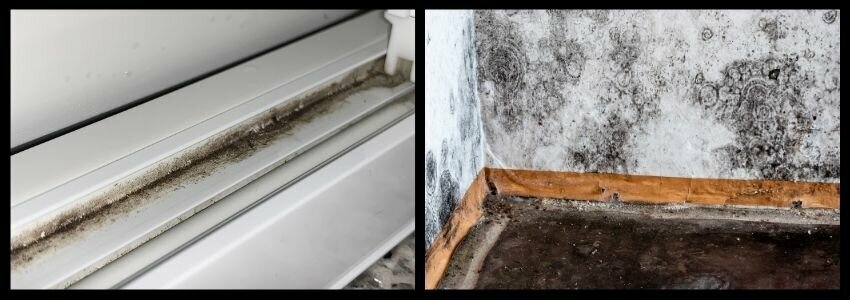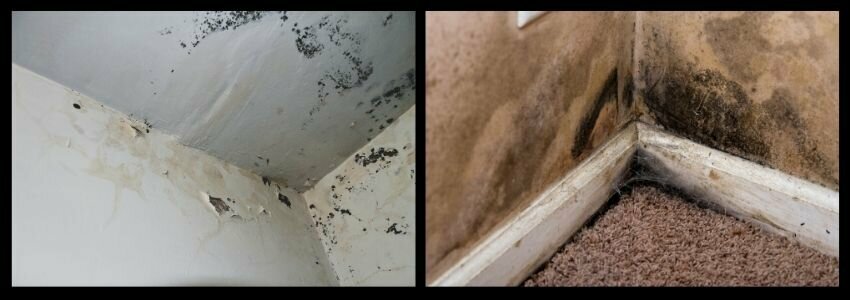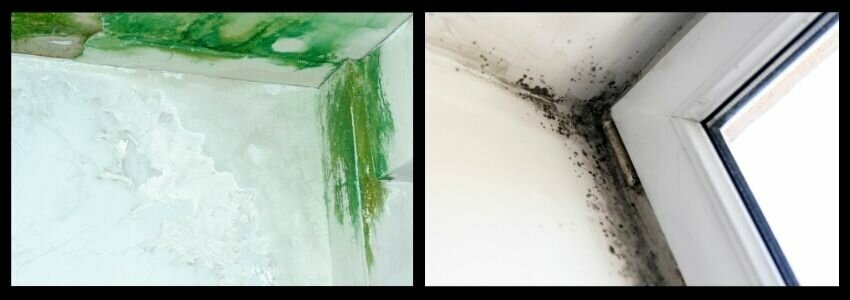There is no clear number of exactly how many types of mold exist in the world, but experts estimate that as many as 100,000 or more types of mold exist — and many of them can show up in your home. So what do you do if you are trying to sell your house and discover a mold problem? What are your options? Read below for everything you need to know about selling a home with mold including black mold, green mold and so forth.
The Problem With Mold in Your Home

Mold is sneaky. It’s a microscopic fungus that shows up uninvited wherever moisture lingers. Bathrooms, attics, and window frames are some of its favorite hangouts. Once it takes hold, mold can appear as fuzzy patches or stubborn stains in shades of black, green, brown, orange, or even white. While not every mold type is harmful, too much of it—or the wrong kind—can create serious health and home issues. And if you’re a homeowner, you’re probably wondering: can you even sell a house if it has mold?
Selling a House with Mold-Is it Legal?
Selling a home with mold isn’t always straightforward. The rules can change depending on where you live, how severe the mold problem is, and what your state or city requires you to disclose to buyers. In this section, we’ll break down the legal side of selling a house with mold and highlight the main reasons why it might be allowed—or why it could land you in hot water.
Reasons Why It May Be Legal to Sell a House with Mold:
- No Disclosure Laws: In some states or regions, there may be no specific laws requiring sellers to disclose mold issues to buyers. However, this can vary widely, so it’s crucial to understand your local regulations.
- As-Is Sale: If the seller clearly states that the property is being sold “as-is,” it may absolve them of responsibility for mold issues. Buyers who purchase a property “as-is” are typically accepting it in its current condition, including any mold problems.
Reasons Why It May Not Be Legal to Sell a House with Mold:
- Health and Safety Concerns: Mold can pose health risks to occupants, and knowingly selling a house with mold without disclosure may expose the seller to legal liability if occupants suffer health issues as a result.
- State Disclosure Laws: Many states have specific laws mandating the disclosure of known mold problems during a real estate transaction. Failing to disclose mold when required can lead to legal consequences.
- Property Condition Laws: Even in the absence of specific mold disclosure laws, general property condition laws may apply. If the mold issue is significant enough to affect the habitability or structural integrity of the property, it could be deemed a violation of these laws.
- Fraud and Misrepresentation: Selling a house with concealed mold issues can be considered fraud or misrepresentation. If the seller is aware of the mold and actively conceals or misrepresents it, they may be held legally accountable.
- Financing and Insurance Issues: Lenders and insurers often require inspections before approving loans or coverage. If mold is discovered during these processes and not disclosed, it can affect financing and insurance agreements.
- Buyer’s Right to Inspections: Buyers typically have the right to inspect a property before purchase. If they discover mold issues during their inspection and the seller did not disclose them, it could lead to legal disputes.
- Rescission of Sale: In some cases, buyers may have the right to rescind the sale or seek damages if mold issues are discovered after the transaction and the seller failed to disclose them.
There are three main classifications of mold:
- Pathogenic. This type of mold can cause serious infections and will affect both weak and strong immune systems.
- Allergenic. This type of mold is not as harmful, especially in small quantities, but it can trigger allergic reactions and cause symptoms in persons with asthma.
- Toxigenic. This mold has mycotoxin which is harmful to a person’s health.
The most notorious type of toxic mold is black mold, which can trigger the harshest reactions in people with asthma or weakened lungs. Thankfully, serious health issues from indoor mold are relatively rare. For most, exposure feels more like seasonal allergies—sneezing, coughing, a runny nose—or in some cases, no symptoms at all.
But just because mold doesn’t make you sick doesn’t mean it’s harmless. And when it comes to selling your home, the problem isn’t only about health. Mold carries a heavy stigma, and even a small patch can be enough to send potential buyers running the other way.
Diagnosing and Treating Your Mold Problem

If you can see mold, you know you have a problem. But spotting it isn’t always that simple—especially if you’ve had a recent leak. Mold loves dark, damp hiding places like crawlspaces, basements, and attics. That’s why bringing in a professional mold inspector is often the smartest move.
Before you put your home on the market, do a thorough walkthrough. Pay close attention to areas where moisture can collect or spots you rarely check. If there’s even a chance that water damage went unnoticed, a professional inspection can give you peace of mind.
When it comes to cleanup, size matters. If the moldy area is smaller than about 10 square feet, you may be able to tackle it yourself. Common DIY methods include scrubbing with bleach, vinegar, baking soda, or even tea tree oil. Just be careful—bleach, for example, often kills visible mold but not the spores. And when mold feels “under attack,” it can release spores into the air, spreading the problem elsewhere. Unless moisture is eliminated, the mold will just come back.
Hiring a Mold Remediation Pro
A simple google search will bring up a host of mold remediation companies. You can anticipate that a professional would use plastic shielding to contain the affected part of your house to prevent cross-contamination. A professional company would bring in expensive equipment like HEPA air cleaners, HEPA vacuums and commercial-grade dehumidifiers to clean all surfaces and clear the air of spores. Hiring a remediation company also means that the area will be treated with a sealer to make the area more resistant to water damage and potential mold problems in the future. These services are often warrantied for a number of years and are the only way to deal with a large-scale mold problem correctly. A potential home buyer would be reassured to have documentation of a professional mold remediation company having dealt with the problem.
Mold Disclosure to Potential Buyers

A home inspection report will detail any current mold problems you might have to potential buyers. If the mold problem was in the recent past then make it a point to disclose everything to the buyer and keep detailed documentation of all the steps taken to solve the mold issue. Documenting includes all repairs made and any tests done as well as the test results. Having clear documentation shows the buyer that you have dealt with the problem in a thorough manner and they protect you from any legal action like a lawsuit, if the buyer purchases the home and has mold issues. Documentation will protect you and give peace of mind to potential buyers.
Selling a Home With Black, Green or Other Mold
The reality is, a home with black, green or other mold problems is going to be a hard sell. Traditional home buyers are cautious of anything that might harm their health or that of their family or cause significant financial problems in the future. A home is a big purchase and a potential buyer will easily walk away from a home with mold listed as a home inspection problem.
To sell your house with a mold problem keep in mind that you’ll have to reduce the price (though the severity of the reduction will depend on the extent of the problem).
One way to get a better sale price is simply to deal with the mold head-on and hiring a professional company to deal with the problem, keeping all of the documentation and ensuring a warranty. While the word “mold” might still strike fear in the hearts of many buyers, having a clearly documented, professionally treated, mold problem in the past won’t scare away the right buyer.
Selling a House With Mold to a House Buying Company
If you don’t have the cash to take care of the mold problem up front, or you have a recurring mold problem that you haven’t been able to clear up, you can also consider working with a non-traditional buyer. We are your local, top rated Utah House buying company. We are not scared away by problems like mold and will make a fair cash offer and take on the risk and time of fixing the mold issue themselves. As a non-traditional buyer, we are much more open to dealing with less-than-perfect homes and are used to working with remediation companies to solve problems like mold.

Thanks for sharing. For people sensitive to mold, inhaling, or touching mold spores can cause allergic reactions, including sneezing, runny nose, red eyes, and skin rash. People with serious mold allergies may have more severe reactions, including shortness of breath.
Regards,
Kurt Haas